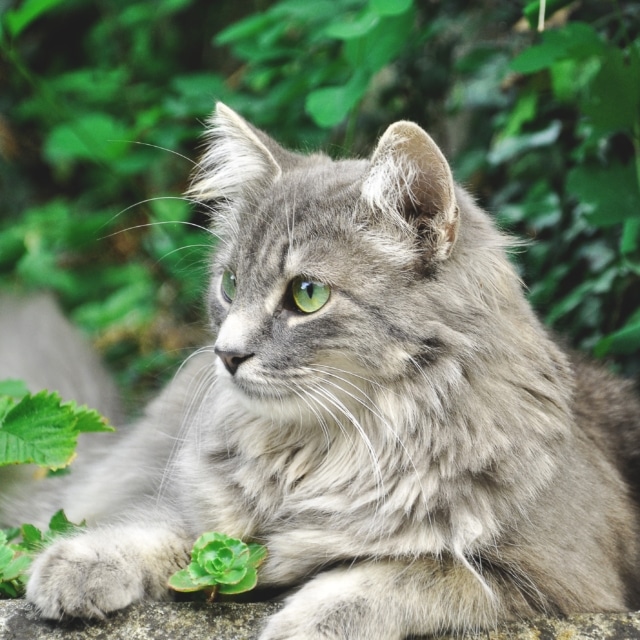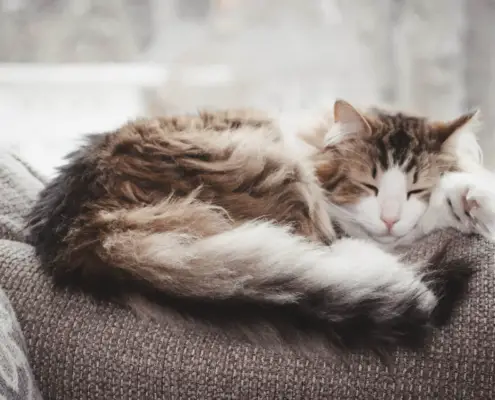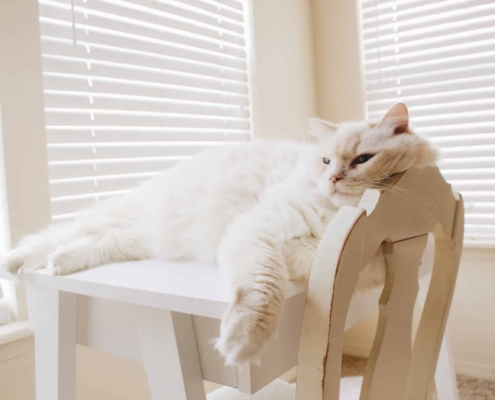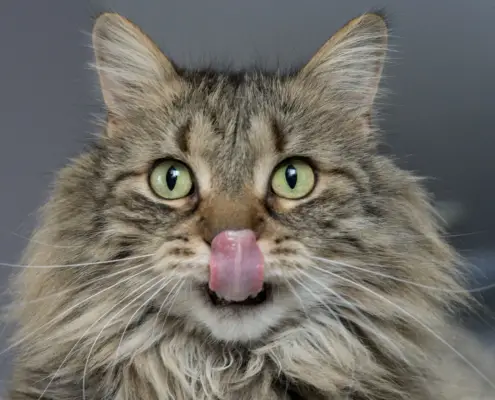
Hairballs are a common issue that many cat owners have to deal with. Cats are meticulous groomers, and during the grooming process, they ingest loose hair. While most of the hair passes through their digestive system without any problems, sometimes it accumulates in their stomach and forms a hairball. Hairballs are cylindrical masses of hair that are vomited by cats. They can be quite distressing for both the cat and the owner.
Causes of hairballs in cats
The main cause of hairballs in cats is their grooming behavior. Cats have rough tongues with tiny hook-like structures called papillae. These papillae help them clean their fur by removing loose hairs. However, when cats groom themselves excessively, they end up swallowing a significant amount of hair. This hair can accumulate in their stomach over time, leading to the formation of hairballs.
Certain factors can increase the likelihood of a cat developing hairballs. Long-haired cat breeds, such as Persians and Maine Coons, are more prone to hairballs because they have more hair to groom. Additionally, cats that shed excessively or those with skin conditions that cause excessive itching may also develop more hairballs.
Signs and symptoms of hairballs in cats
Hairballs can cause various signs and symptoms in cats. The most common symptom is frequent vomiting, often accompanied by retching or gagging sounds. Sometimes, cats may also pass hairballs in their feces. Other signs to look out for include a decrease in appetite, constipation, and lethargy. If your cat displays any of these symptoms, it is essential to monitor them closely and seek veterinary attention if necessary.
The dangers of hairballs in cats
While hairballs are generally harmless, they can occasionally pose a risk to the health of cats. If a hairball becomes too large, it may obstruct the cat’s digestive system, causing discomfort and even severe complications. Intestinal blockages can lead to symptoms like abdominal pain, loss of appetite, and constipation. In some cases, surgery may be required to remove the blockage. Therefore, it is crucial to take steps to prevent the formation of hairballs in cats.
Preventing hairballs in cats – grooming and diet tips
Regular grooming is key to preventing hairballs in cats. Brushing your cat’s coat helps to remove loose hair before it is ingested during grooming. For long-haired breeds, daily brushing is recommended, while short-haired breeds can be brushed a few times a week. Additionally, consider using a grooming tool specifically designed to remove loose hair, such as a deshedding comb or brush.
Diet also plays a role in preventing hairballs. High-fiber cat food can help to move hair through the digestive system more efficiently, reducing the likelihood of hairballs. There are also specialized cat foods available that are formulated to reduce hairball formation. These foods typically contain ingredients like fiber and lubricants that aid in the passage of hair through the digestive tract.
Home remedies for hairballs in cats
If your cat is prone to hairballs, there are several home remedies you can try. One popular option is adding a teaspoon of plain canned pumpkin to your cat’s food. Pumpkin is high in fiber and can help move hair through the intestines. Another remedy is adding a small amount of olive oil or fish oil to your cat’s food. These oils lubricate the digestive tract, making it easier for hair to pass through. However, it’s essential to consult your veterinarian before trying any home remedies to ensure they are safe for your cat.
Over-the-counter solutions for hairballs in cats
If home remedies do not provide sufficient relief, there are over-the-counter solutions available specifically designed to reduce hairballs in cats. These solutions often come in the form of treats or gels that can be given to your cat regularly. They typically contain ingredients like petroleum jelly or mineral oil, which help to lubricate the digestive system and facilitate the passage of hair. It’s important to follow the instructions provided and consult your veterinarian before using any over-the-counter products.
Veterinary treatments for hairballs in cats
In severe cases or when home remedies and over-the-counter solutions are not effective, your veterinarian may recommend certain medical treatments for hairballs. These treatments can include prescription medications that help to prevent hairball formation or medications that promote gastrointestinal motility. Additionally, if a hairball has caused an intestinal blockage, surgical intervention may be necessary. Your veterinarian will be able to determine the most appropriate treatment option for your cat based on their individual needs.
Living with a cat prone to hairballs – tips and tricks
If you have a cat that is prone to hairballs, there are several tips and tricks you can implement to help manage the issue. Regular grooming should be a priority, as it helps to remove loose hair before it is ingested. Providing your cat with toys or scratching posts that encourage play and exercise can also help to reduce hairball formation by promoting movement and digestion. Additionally, ensuring your cat has access to fresh water and a balanced diet that includes hairball prevention cat food can contribute to their overall well-being.
Keeping your cat hairball-free
Hairballs are a common issue in cats, but with the right preventive measures, they can be managed effectively. Regular grooming, a balanced diet, and the use of home remedies or over-the-counter solutions can help reduce the formation of hairballs. If the issue persists or becomes severe, it is important to consult your veterinarian for further guidance. By taking proactive steps, you can keep your feline friend happy and hairball-free.
If you enjoyed my article, I would appreciate you sharing it with your network.

Sima Ndlebe
Sima writes for CatBuzz. He is interested in Cats, Health and Fitness, and Entrepreneurship.
Published: 12 October 2023
Related Articles
Disclaimer
The content found on CatBuzz.org is presented on an "as is" basis and is intended for general consumer information and education purposes only. Any utilization of this information is voluntary and solely at the user's own risk.
None of the articles or content should be regarded as, or used in place of, veterinary medical advice, diagnosis, or treatment. The information provided on the website is purely for educational and informational intentions and should not be considered a substitute for professional guidance from a veterinarian or other qualified expert. The articles are designed to inform consumers about veterinary healthcare and medical matters that may impact their cat's daily life. It should be noted that this website and its services do not constitute the practice of any form of veterinary medical advice, diagnosis, or treatment. CatBuzz.org explicitly disclaims any liability for any direct or indirect damages or losses that may arise from the use of or reliance on the information contained within the content.
Consumers must consult a veterinarian, veterinary specialist, or another qualified veterinary healthcare provider when seeking advice regarding their cat's health or medical conditions. It is important not to ignore, avoid, or postpone seeking medical advice from a veterinarian or other qualified veterinary healthcare provider solely based on information obtained from this website. If you believe that your cat may be experiencing a medical issue or condition, it is imperative to promptly contact a qualified veterinary healthcare professional.




